You'll find several thyme-infused teas that can boost your lung health and respiratory wellness. Top choices include Thyme and Ginger Blend for its anti-inflammatory properties, Lemon Thyme Infusion rich in vitamin C, and Eucalyptus Thyme Fusion for its decongestant effects. Peppermint Thyme Refresh soothes throat irritation, while Thyme and Licorice Root Mix supports lung function. Other beneficial options are Rosemary Thyme Aromatic Blend, Elderberry Thyme Immune Boost, Fennel Thyme Digestive Support, and Lavender Thyme Relaxation Tea. Each blend offers unique benefits, combining thyme's respiratory support with complementary herbs. Exploring these teas can open up a world of natural respiratory care.
Key Takeaways
- Thyme and Ginger Blend combines thyme's mucus-clearing properties with ginger's anti-inflammatory effects for optimal lung health.
- Eucalyptus Thyme Fusion offers powerful expectorant and decongestant properties, effectively clearing airways and supporting respiratory function.
- Elderberry Thyme Immune Boost enhances lung defenses with antioxidants and vitamin C, reducing inflammation and supporting overall respiratory health.
- Lemon Thyme Infusion provides a vitamin C boost, helping to clear mucus and reduce respiratory inflammation.
- Chamomile Thyme Calming Brew soothes respiratory irritation and promotes relaxation, potentially easing symptoms of allergies and asthma.
Thyme and Ginger Blend

One of the most potent combinations for lung health is the thyme and ginger blend. This dynamic duo packs a powerful punch, offering a range of benefits for your respiratory system.
Thyme contains thymol, a compound known for its antimicrobial properties, which can help fight off respiratory infections. Ginger, on the other hand, boasts anti-inflammatory effects that may reduce lung inflammation and ease breathing difficulties.
To prepare this lung-boosting tea, you'll need fresh thyme sprigs and grated ginger root. Steep them in hot water for about 5-7 minutes, allowing the flavors and beneficial compounds to infuse. You can add a touch of honey for sweetness and its additional throat-soothing properties.
Drink this tea once or twice daily to support your lung health. It's especially beneficial during cold and flu season or if you're experiencing respiratory issues.
The warm, aromatic vapors from the tea can also help clear your sinuses and promote easier breathing. Remember, while this blend is generally safe, it's always wise to consult with your healthcare provider before incorporating new herbal remedies into your routine, especially if you have pre-existing health conditions or are taking medications.
Lemon Thyme Infusion
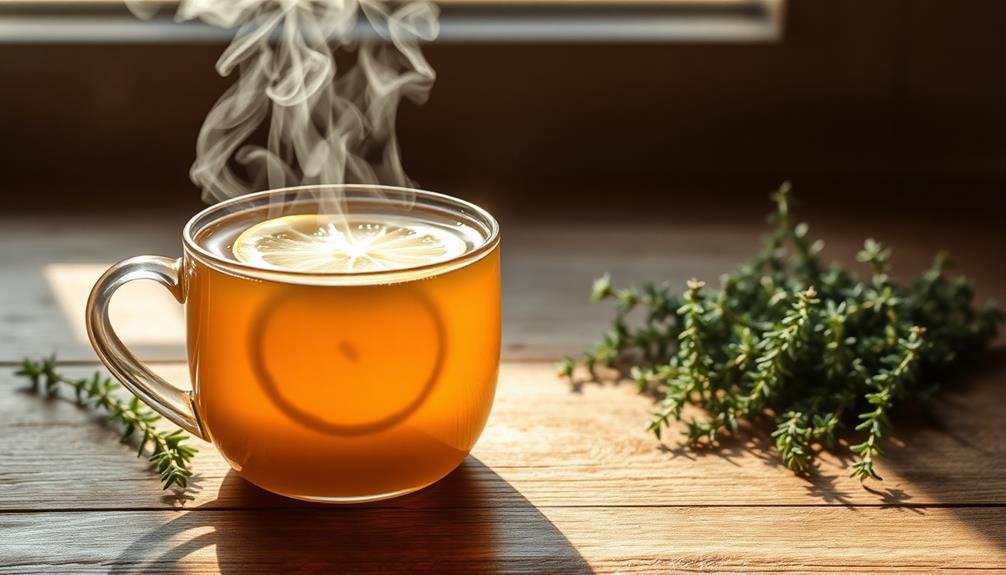
Moving from the powerful thyme and ginger blend, we'll explore another revitalizing option for lung health: the Lemon Thyme Infusion. This invigorating tea combines the respiratory benefits of thyme with the zesty kick of lemon, creating a delightful and effective blend for supporting your lungs.
To prepare this infusion, you'll need fresh thyme sprigs and lemon slices. Steep them in hot water for about 5-7 minutes, allowing the flavors to meld and the beneficial compounds to release. The resulting tea offers a bright, citrusy aroma and a subtle earthy undertone from the thyme.
The Lemon Thyme Infusion provides several advantages for lung health:
- Thyme's expectorant properties help clear mucus from your airways
- Lemon's vitamin C content boosts your immune system
- The combination may help reduce inflammation in your respiratory tract
You can enjoy this tea hot or cold, making it versatile for any season. For an extra boost, add a teaspoon of honey to soothe your throat and enhance the tea's antimicrobial properties.
Incorporating this infusion into your daily routine can be a tasty way to support your lung health naturally.
Eucalyptus Thyme Fusion
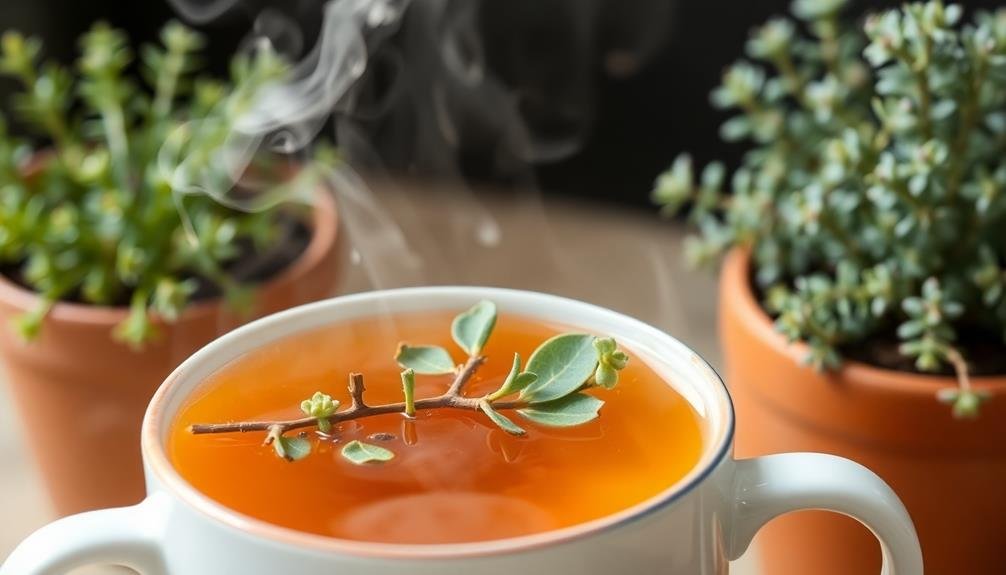
After exploring the invigorating Lemon Thyme Infusion, let's plunge into the potent Eucalyptus Thyme Fusion. This powerful blend combines the respiratory benefits of thyme with the soothing properties of eucalyptus, creating a tea that's especially beneficial for lung health.
To prepare this fusion, you'll need fresh thyme sprigs and eucalyptus leaves. Steep them together in hot water for 5-7 minutes, allowing the herbs to release their essential oils. The resulting tea offers a revitalizing, minty flavor with earthy undertones.
Eucalyptus Thyme Fusion is known for its expectorant and decongestant properties. It can help clear your airways, reduce inflammation, and ease breathing difficulties. The tea's antimicrobial qualities also support your immune system, making it an excellent choice during cold and flu season.
For maximum benefits, drink this tea warm and inhale the steam as you sip. You can add a touch of honey to sweeten the brew and enhance its soothing effects on your throat.
Enjoy this fusion 2-3 times daily when you're feeling congested or simply want to give your lungs some extra support.
Peppermint Thyme Refresh
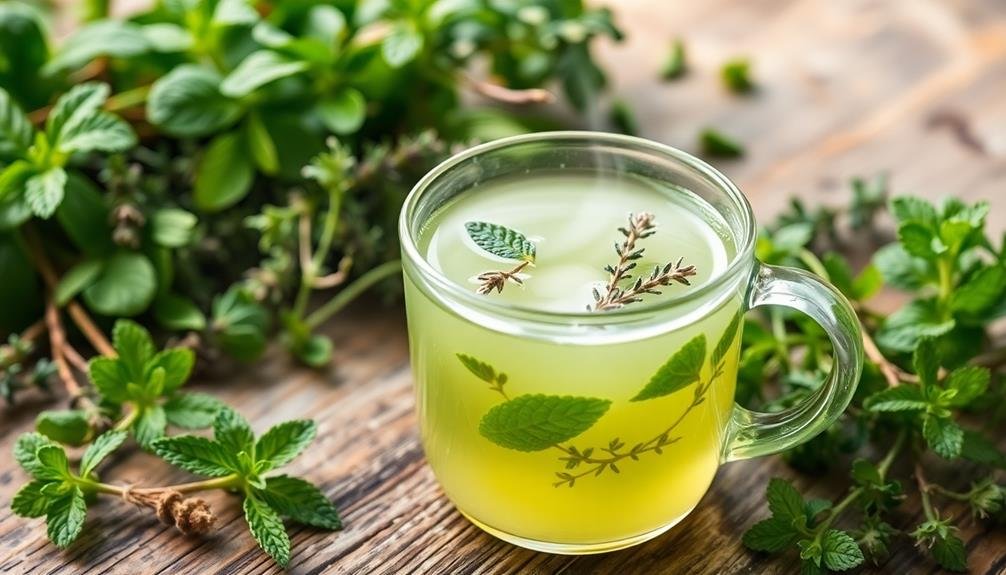
The invigorating combination of peppermint and thyme creates a delightful and lung-supporting tea. This revitalizing blend offers a cooling sensation while providing the respiratory benefits of thyme.
You'll find that the menthol in peppermint helps to open your airways, making it easier to breathe, while thyme's natural expectorant properties assist in clearing mucus from your lungs.
To enjoy this revitalizing tea, steep 1 teaspoon of dried thyme and 1 teaspoon of dried peppermint leaves in hot water for 5-7 minutes. You can add a touch of honey for sweetness if desired. Drink this tea 2-3 times daily for ideal respiratory support.
The Peppermint Thyme Refresh offers several benefits:
- Soothes throat irritation and reduces coughing
- Promotes clearer breathing and decongestion
- Boosts your immune system with antioxidants
You'll appreciate how this tea not only supports your lung health but also provides a revitalizing pick-me-up throughout the day.
Its crisp, minty flavor combined with thyme's earthy notes creates a balanced and enjoyable drink. Make this tea a part of your daily routine to maintain healthy lungs and overall respiratory wellness.
Thyme and Licorice Root Mix

You'll find that combining thyme with licorice root creates a potent tea blend for supporting lung health. This dynamic duo offers a range of benefits for your respiratory system.
Thyme's natural expectorant properties help clear mucus from your airways, while licorice root soothes irritated throat tissues and reduces inflammation.
To prepare this lung-boosting tea, steep 1 teaspoon of dried thyme and 1/2 teaspoon of licorice root in hot water for 5-7 minutes. Strain and add honey if desired. The resulting brew has a unique flavor profile – thyme's earthy, slightly minty taste complements licorice's natural sweetness.
Drink this tea 1-2 times daily to support your lung function. It's particularly helpful during cold and flu season or if you're dealing with respiratory issues.
However, don't overdo it with licorice root, as excessive consumption can lead to side effects. If you're pregnant, have high blood pressure, or take certain medications, consult your doctor before incorporating this tea into your routine.
Chamomile Thyme Calming Brew
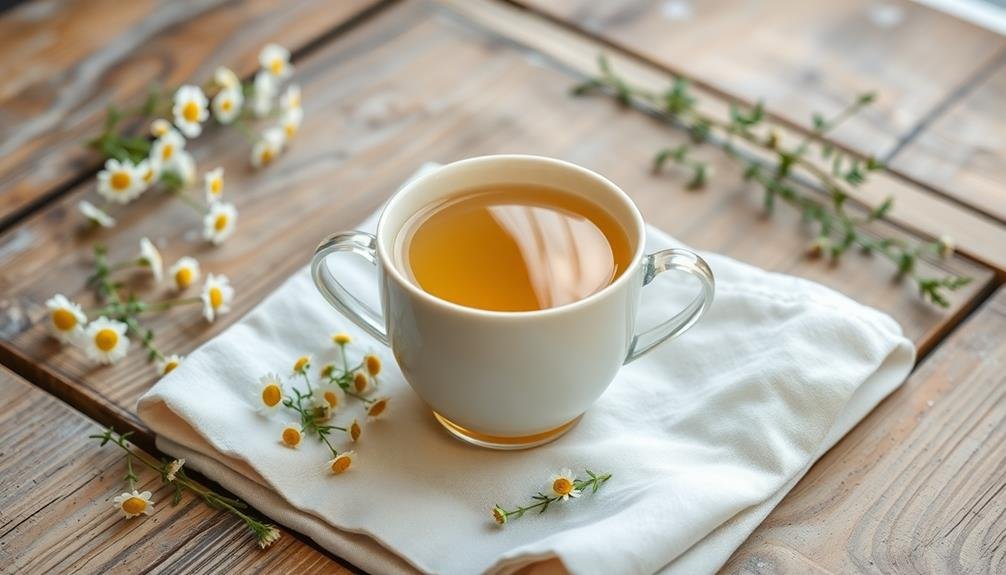
Frequently, combining chamomile and thyme creates a soothing tea blend that's perfect for relaxing your body and supporting lung health. This calming brew offers a unique combination of flavors and health benefits.
Chamomile's gentle floral notes complement thyme's earthy, slightly minty taste, resulting in a balanced and enjoyable drink.
To prepare this lung-supporting tea, steep equal parts dried chamomile flowers and thyme leaves in hot water for 5-7 minutes. Strain and enjoy the warm, aromatic infusion. You can add a touch of honey for sweetness if desired.
The Chamomile Thyme Calming Brew offers several benefits:
- Promotes relaxation and reduces stress, which can indirectly support lung function
- Helps soothe respiratory irritation and may ease coughing
- Provides antioxidants that support overall lung health
Drinking this tea regularly, especially before bedtime, can help you unwind and potentially improve your respiratory wellness.
It's a caffeine-free option that won't interfere with your sleep. Remember to consult your healthcare provider before using herbal teas for medicinal purposes, especially if you have allergies or are taking medications.
Rosemary Thyme Aromatic Blend
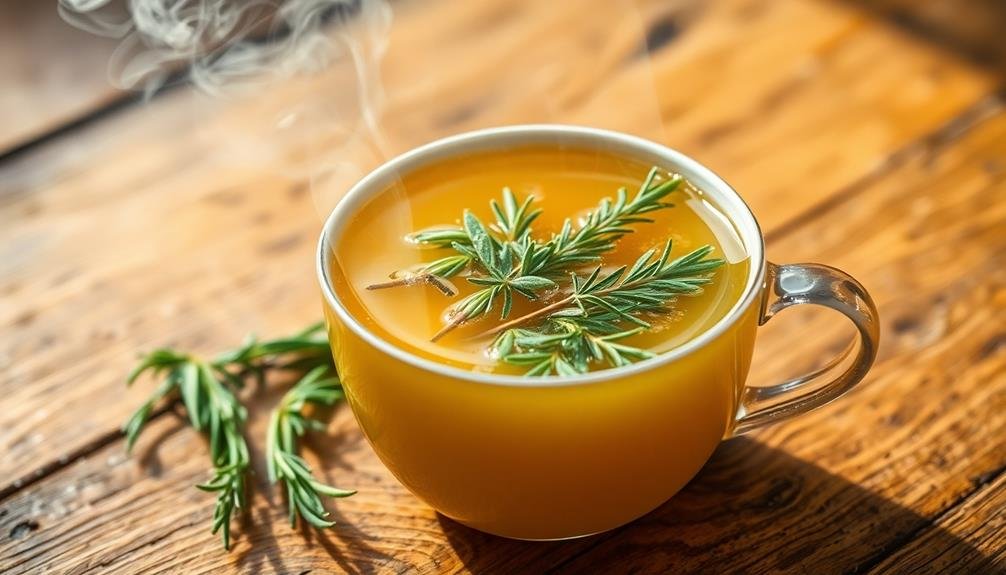
Fragrant and invigorating, the Rosemary Thyme Aromatic Blend combines two powerful herbs known for their respiratory benefits. This aromatic blend harnesses the therapeutic properties of rosemary and thyme to support lung health and promote clearer breathing.
You'll find that rosemary contributes its natural anti-inflammatory and antioxidant properties to this blend. It's known to help open airways and reduce congestion, making it easier to breathe deeply.
Thyme, on the other hand, brings its expectorant qualities to the mix, helping to loosen and expel mucus from the lungs.
To prepare this blend, steep one teaspoon each of dried rosemary and thyme in hot water for 5-7 minutes. You can add a touch of honey for sweetness if desired. The resulting tea offers a robust, herbaceous flavor with a hint of minty freshness.
For best results, drink this tea 2-3 times daily, especially during cold and flu season or when you're experiencing respiratory discomfort.
The aromatic steam from the hot tea can also provide immediate relief by helping to clear nasal passages and soothe irritated airways.
Elderberry Thyme Immune Boost

You'll find a powerful antioxidant combination in the Elderberry Thyme Immune Boost tea.
This blend offers respiratory health benefits, supporting your lungs and overall immune system.
You can easily prepare this tea at home using dried elderberries and fresh thyme leaves.
Powerful Antioxidant Combination
Synergy takes center stage in this powerful antioxidant combination of elderberry and thyme. These two superstar ingredients work together to create a tea that's not just delicious but also incredibly beneficial for your lung health.
Elderberry brings its renowned immune-boosting properties to the table, while thyme contributes its expectorant and antimicrobial qualities.
When you brew this potent blend, you're treating your body to a wealth of antioxidants that can help:
- Combat free radicals and reduce oxidative stress
- Support your respiratory system's natural defense mechanisms
- Soothe inflammation in your airways
The elderberry's high vitamin C content complements thyme's rosmarinic acid, creating a formidable duo that can help strengthen your overall immune response.
This combination is particularly effective during cold and flu season, when your lungs need extra support. By sipping on this tea regularly, you're not only enjoying a comforting beverage but also providing your body with a natural defense against respiratory challenges.
Remember to steep the tea for at least 5-7 minutes to fully extract the beneficial compounds from both elderberry and thyme.
Respiratory Health Benefits
The elderberry-thyme combination doesn't just boost your immune system; it specifically targets respiratory health. This powerful duo works synergistically to support your lungs and airways, helping you breathe easier and maintain overall respiratory wellness.
Thyme contains essential oils like thymol and carvacrol, which have expectorant and bronchodilator properties. These compounds help loosen mucus and relax your airways, making it easier to clear congestion and breathe more freely. Additionally, thyme's antimicrobial properties can help fight respiratory infections.
Elderberry complements thyme's benefits by reducing inflammation in your respiratory tract. It's rich in anthocyanins and other flavonoids that have anti-inflammatory effects, potentially easing symptoms of allergies, asthma, and bronchitis.
Elderberry also supports ciliary function, helping your lungs naturally remove irritants and pathogens.
When combined in a tea, these herbs create a soothing and effective remedy for respiratory issues. Regular consumption may help prevent respiratory infections, alleviate symptoms of existing conditions, and improve overall lung function.
You'll find that this thyme-elderberry tea not only tastes pleasant but also provides tangible benefits for your respiratory health.
Easy Preparation Method
Preparing this immune-boosting elderberry and thyme tea is a breeze, even for novice herbalists. You'll need dried elderberries, fresh thyme sprigs, and honey.
Begin by bringing 2 cups of water to a boil in a small saucepan. Add 2 tablespoons of dried elderberries and 2-3 sprigs of fresh thyme. Reduce the heat and let it simmer for 15 minutes, allowing the flavors to infuse.
After simmering, remove the pan from heat and strain the liquid into a mug, discarding the solids. Let the tea cool slightly before adding honey to taste. For maximum benefits, drink this tea while it's still warm. You can prepare a larger batch and store it in the refrigerator for up to three days, reheating as needed.
To enhance your tea-making experience and boost its effectiveness, consider these tips:
- Use organic ingredients to avoid pesticides and maximize nutritional value
- Experiment with different ratios of elderberry to thyme to find your preferred flavor
- Add a squeeze of lemon for an extra vitamin C boost
Fennel Thyme Digestive Support
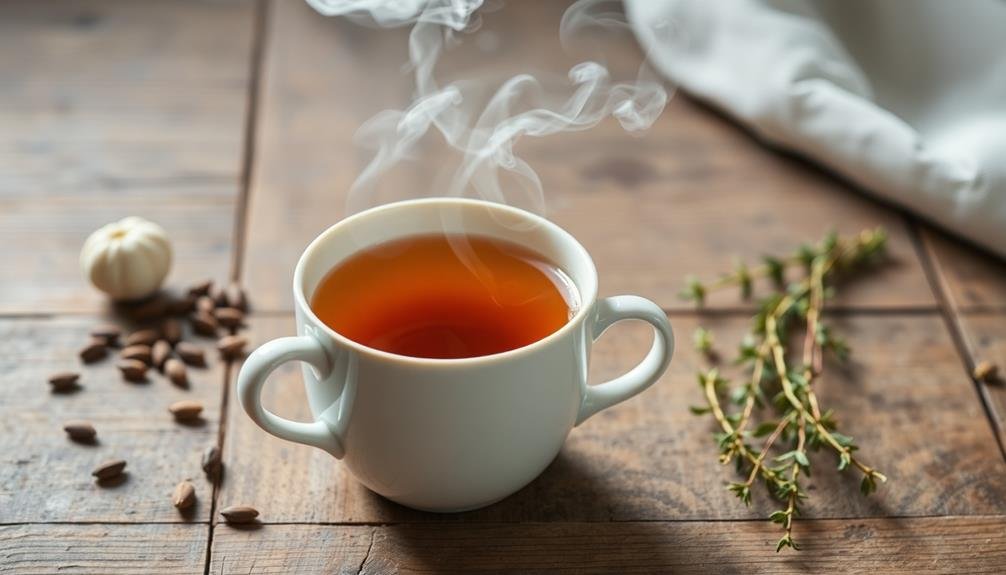
While thyme is renowned for its lung benefits, it's also a powerful digestive aid when paired with fennel.
You'll find this combination soothes digestive discomfort and promotes healthy gut function.
The fennel-thyme flavor profile offers a unique blend of sweet anise notes and earthy herbaceousness, making it both therapeutic and enjoyable to drink.
Soothing Digestive Discomfort
Occasionally, digestive discomfort can disrupt your daily routine, but a soothing fennel-thyme tea blend might offer relief. This powerful combination harnesses the digestive benefits of both herbs, creating a potent remedy for various gastrointestinal issues.
Fennel's natural compounds help relax the digestive tract muscles, reducing bloating and cramping, while thyme's carminative properties aid in expelling gas and easing indigestion.
To prepare this soothing blend, steep equal parts fennel seeds and dried thyme in hot water for 5-7 minutes. You can enhance the flavor and effectiveness by adding a touch of honey or a slice of lemon. Drink this tea after meals or whenever you experience digestive discomfort.
The fennel-thyme tea blend offers several benefits:
- Reduces bloating and gas
- Calms stomach cramps and nausea
- Supports overall digestive health
Fennel-Thyme Flavor Profile
Savor the unique flavor profile of fennel-thyme tea, a blend that's as delicious as it's beneficial for digestive support. This aromatic combination brings together the sweet, licorice-like taste of fennel with the earthy, slightly minty notes of thyme.
You'll notice a subtle warmth and complexity that develops as you sip, making it an enjoyable experience beyond its health benefits. The fennel contributes a mild sweetness and a hint of anise, while thyme adds a gentle herbaceous quality.
This pairing creates a balanced flavor that's neither overpowering nor bland. As you drink, you'll detect layers of taste that unfold gradually, from the initial sweetness to a slightly spicy finish.
This tea's flavor profile makes it versatile enough to enjoy hot or iced. It pairs well with honey for added sweetness or lemon for a citrusy twist.
The fennel-thyme combination not only pleases your palate but also supports your digestive system. You'll find it particularly soothing after meals or as a calming evening beverage.
Its pleasant taste guarantees you'll look forward to each cup, making it easier to incorporate this healthful brew into your daily routine.
Lavender Thyme Relaxation Tea
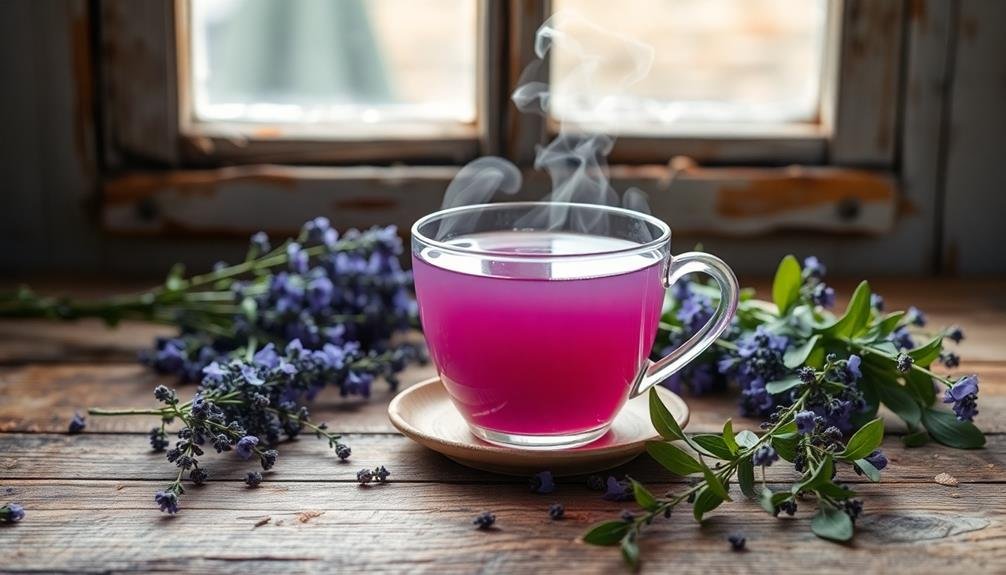
A soothing cup of Lavender Thyme Relaxation Tea can work wonders for both your lungs and your stress levels. This delightful blend combines the respiratory benefits of thyme with the calming properties of lavender, creating a perfect balance for overall wellness.
As you sip this aromatic tea, you'll notice its gentle floral notes complemented by the earthy undertones of thyme.
To make the most of your Lavender Thyme Relaxation Tea experience, consider these tips:
- Steep the tea for 5-7 minutes to extract the full range of beneficial compounds
- Add a teaspoon of raw honey for added sweetness and throat-soothing properties
- Enjoy the tea in a quiet, comfortable space to enhance its relaxation effects
The thyme in this blend helps support respiratory health by acting as an expectorant and bronchodilator, making it easier to breathe.
Meanwhile, lavender's natural sedative properties can help reduce anxiety and promote better sleep. This combination is particularly beneficial if you're dealing with stress-induced respiratory issues or looking to improve your overall lung function while unwinding after a long day.
Incorporate this tea into your daily routine to experience its dual benefits for your lungs and mental well-being.
Frequently Asked Questions
How Long Should Thyme-Infused Tea Steep for Optimal Health Benefits?
You'll want to steep your thyme-infused tea for 5-10 minutes to get the most health benefits. Don't oversteep, as it can make the tea bitter. Adjust the time based on your taste preferences and desired strength.
Can Pregnant Women Safely Consume Thyme-Infused Teas?
You can safely consume thyme-infused teas during pregnancy, but in moderation. It's best to consult your doctor first. While thyme offers health benefits, it's wise to limit your intake and avoid excessive consumption when pregnant.
Are There Any Potential Side Effects of Drinking Thyme Tea Regularly?
While generally safe, drinking thyme tea regularly can cause stomach upset, headaches, or dizziness. You might experience allergic reactions if you're sensitive to thyme. It can also interact with certain medications, so consult your doctor if you're concerned.
How Many Cups of Thyme Tea per Day Are Recommended for Lung Health?
You'll want to drink 1-3 cups of thyme tea daily for lung health benefits. It's best to start with one cup and gradually increase. Don't exceed 3-4 cups per day to avoid potential side effects.
Can Thyme-Infused Teas Interact With Certain Medications or Medical Conditions?
Yes, thyme-infused teas can interact with certain medications and conditions. If you're taking blood thinners, have a bleeding disorder, or are pregnant, you should consult your doctor before drinking thyme tea regularly. It's always best to be cautious.
In Summary
You've now explored a variety of thyme-infused teas that can support your lung health. By incorporating these blends into your daily routine, you're taking a natural approach to respiratory wellness. Don't forget to experiment with different combinations to find your favorites. Remember, while these teas can be beneficial, they're not a substitute for medical advice. If you have ongoing lung concerns, it's best to consult with your healthcare provider.




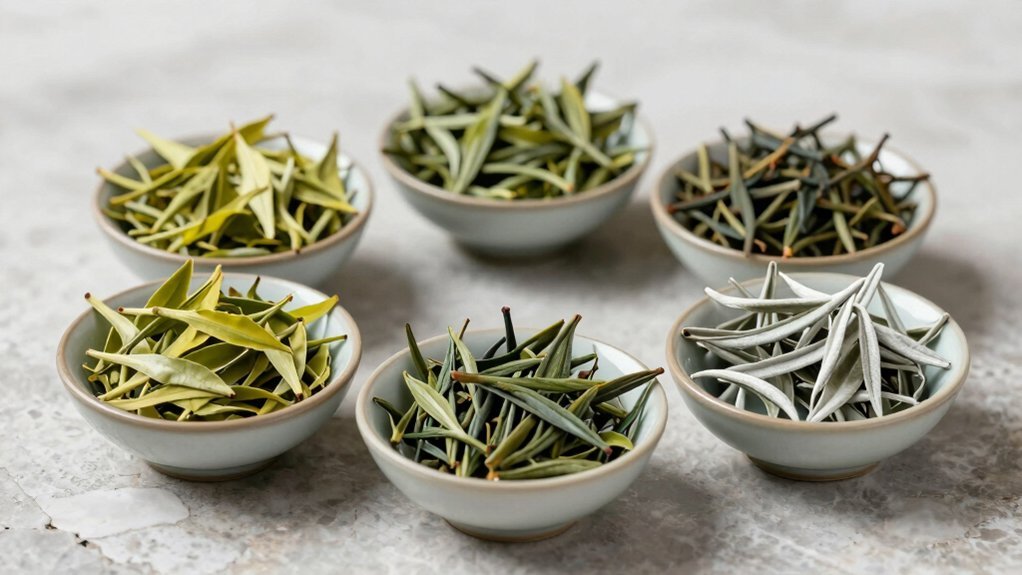
Leave a Reply